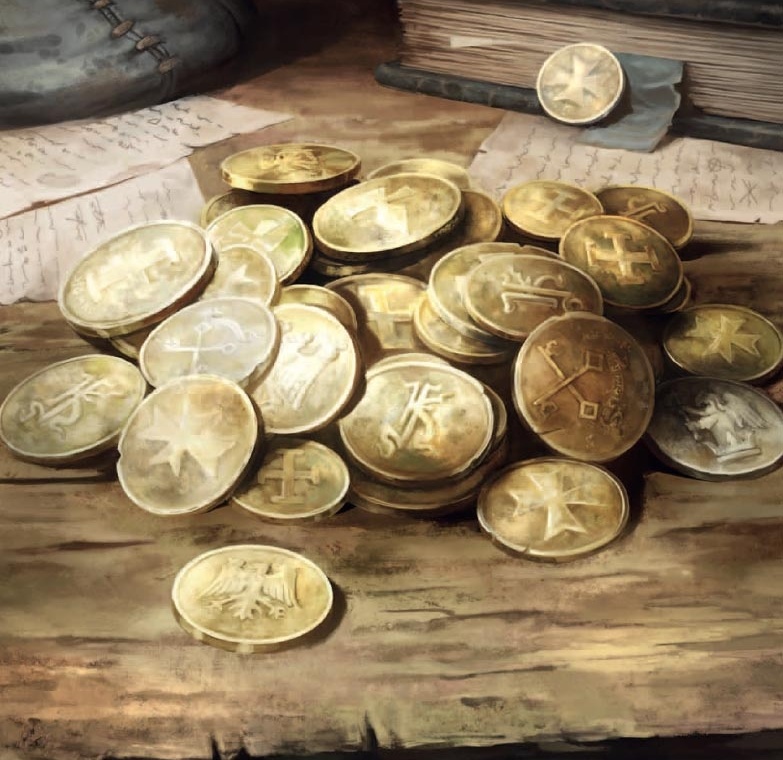Difference between revisions of "Coin (monetary unit)"
Tao alexis (talk | contribs) |
Tao alexis (talk | contribs) |
||
| Line 22: | Line 22: | ||
|} | |} | ||
| − | The inconvenient ratios shown are deliberate | + | The inconvenient ratios shown are deliberate. Medieval and Renaissance precedents disregarded the convenience of exchange that a decimal system offered. The intent was to approximate the actual value of the one coin in comparison with the actual value of another. One silver coin is deemed to be 1/16th as valuable as one gold coin on the world market — in which the value of coins is an immutable, unchanging principle in the determination of all [[Trade System|trade]] [[Pricing Equipment|prices]]. This doesn't have to "make sense" — D&D is a game, and a game is ruled by it's playability, not its capacity to accurately simulate numismatics. |
| + | |||
| + | == Experience == | ||
| + | [[Experience (X.P.)|Experience points]] (X.P.) are given when coins are earned through plunder and theft, actions which forcefully redirect the accumulation of wealth from others into the players' possession. Experience is not gained from "exchange" of money for goods — as the player's wealth isn't actually increased — nor through gambling, in which wealth increases for one person at the expense of another, but only because the adjustment was ''agreed upon by both parties''. Therefore, gambling is not "force," and coin or wealth gained through gambling is not translated into experience. | ||
| + | |||
| + | Since all goods have a monetary value, all items that are plundered or stolen may have their value calculated in coins — and therefore the value of goods may be granted as experience. | ||
| + | |||
| + | ==== Calculating X.P. ==== | ||
Revision as of 02:57, 21 December 2021
Coins are small, flat pieces of metal, minted with images, numerals and text. Standardized in weight, materials and value, they are issues by numerous monarchs and republics. The study of coins is numismatics.
For game playability, by will of the gods, every coin of each type — gold, silver or copper — has the same dimensions and value, though they may have different images on the actual coin. While anachronistic, attempts in the past to create individualised coinage, with multiple values that must be exchanged when moving from one kingdom to the next, proved possible but offered no meaningful contribution to the game's play. After testing this variable system for two years, with no appreciable results, the current system was adopted.
Characteristics
Copper coins or pieces (c.p.) are made of an alloy of copper, nickel and silver. Each copper coin weighs 0.8 oz., or about 23 grams. 10 c.p. weighs ½ a pound. It requires 12 c.p. to equal 1 silver piece.
Silver coins or pieces (s.p.) are made of an alloy of silver and nickel. Each silver coin weighs 0.6 oz., or about 17 grams. 10 s.p. weighs ⅜ of a pound. It requires 16 s.p. to equal 1 gold piece.
Gold coins or pieces (g.p.) are made of an alloy of gold, nickel and silver. Each gold coin weighs 0.4 oz., or nearly 12 grams, of which 8.715 oz. is officially gold. 10 g.p. weighs ¼ of a pound.
| Coin | c.p. | s.p. | g.p. |
|---|---|---|---|
| c.p. | 1 | 1/12 | 1/192 |
| s.p. | 12 | 1 | 1/16 |
| g.p. | 192 | 16 | 1 |
The inconvenient ratios shown are deliberate. Medieval and Renaissance precedents disregarded the convenience of exchange that a decimal system offered. The intent was to approximate the actual value of the one coin in comparison with the actual value of another. One silver coin is deemed to be 1/16th as valuable as one gold coin on the world market — in which the value of coins is an immutable, unchanging principle in the determination of all trade prices. This doesn't have to "make sense" — D&D is a game, and a game is ruled by it's playability, not its capacity to accurately simulate numismatics.
Experience
Experience points (X.P.) are given when coins are earned through plunder and theft, actions which forcefully redirect the accumulation of wealth from others into the players' possession. Experience is not gained from "exchange" of money for goods — as the player's wealth isn't actually increased — nor through gambling, in which wealth increases for one person at the expense of another, but only because the adjustment was agreed upon by both parties. Therefore, gambling is not "force," and coin or wealth gained through gambling is not translated into experience.
Since all goods have a monetary value, all items that are plundered or stolen may have their value calculated in coins — and therefore the value of goods may be granted as experience.
